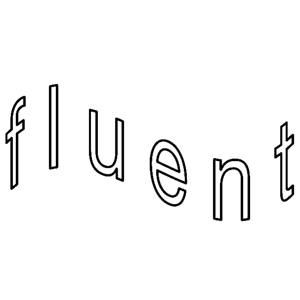December 16, 2021–February 17, 2022
Calle Luis Hoyos Sainz, 2
39001 Santander Cantabria
Spain
Hours: Wednesday–Friday 10am–1pm,
Wednesday–Friday 5–8pm
hello@fluentfluent.org
fluent is excited to announce Proteínas, a pilot educational project aimed at engaging with local young communities. Extending on our exhibition and book spaces, Proteínas examines the notion of learning and the energy interactions that educational infrastructures propitiate, through a series of workshops, presentations and readings. Focused on the complex spiritual–intellectual–physical–productive continuum that connects self, community and planet, it poses a vision on education which could not be more real nor more intrinsic to all physical, cultural and bio–social processes.
Titled under the notion of protein—(n.), /ˈprəʊtiːn/ the term was coined in 1838 by Dutch chemist Gerhard Johan Mulder—a substance capable of performing a vast array of functions within organisms, including catalyzation, metabolization, replication, stimuli response, transportation and structural configuration, proteins are the primary substance in transforming nutrients into energy. Taking this embodied/poetic image as point of departure, Proteínas speculates on the multiple strategies through which learning can become energy by incorporating exterior elements into our own bodies, informing molecular, subjective and collective landscapes.
Thus, much of the programme’s intent is to expand rational, objectifying and logically–driven forms of knowledge into an expanded bodily and poetic thinking. Through this, it focuses on the ways resilience can grow and how communities can become more porous to peripheral, non–academic and marginal forms of knowing. As we imagine institutions, economies and inherited social structures melting into a new worldview, we need our curricula to respond to the movements and needs of our bodies, minds, habitats and spirits.
Through a series of physical gatherings and online presentations Proteínas unfolds in a series of intimate methodologies structured in three sessions and an ongoing transversal workshop:
Thursday, December 16, 6:30pm
Camila Marambio, Scattered, light, otherwise I die.
This conversation with Camila Marambio will be a moving exploration on how solar energy circulates. We will travel, write, and rest in dance.
Camila Marambio is a Chilean artist, writer, somatic researcher and director of the curatorial platform Ensayos, which she founded in 2010 in Tierra del Fuego, Patagonia. Ensayos brings together artists, scientists and locals to exercise speculative and emergent forms of eco-cultural ethics at the world’s end. Marambio is currently a Postdoctoral Researcher at the Royal Academy of Art in Stockholm as part of The Seedbox: A Mistra-Formas Environmental Humanities Collaboratory at Linkoping University, and is curator of Turba Tol Hol Hol Tol, the Chilean Pavilion at the upcoming 59th Venice Biennale.
Monday, December 27, 6:30pm
Sofía Lemos, Journey to the One.
In this talk, Lemos shares preliminary notes from Journey to the One, a critical-poetic meditation and way of reading experimental contemplative practices as utopian modes of critique. Following Gayatry Spivak’s provocation to reimagine our planet with critical and transformative prospects, it proposes a poetics of wayfinding and sense-making based on subtle bodies of knowledge drawn from western and eastern traditions to reflect on the circumstances under which utopias emerged during colonial modernity because of their alleged unchartability. In an attempt to chart how these realities exceed existing frameworks of representation, it also queries the potential of public programmes as medium.
Sofia Lemos is a curator and writer. She is Curator at TBA21 - Thyssen-Bornemisza Art Contemporary. Recently she has been Curator of Public Programmes and Research at Nottingham Contemporary and Associate Curator Public Programmes to the 2nd Riga International Biennial of Contemporary Art – RIBOCA (2020).
Tuesday, December 28, 6:30pm
TANJ
Drawing from TANJ’s exploration on sexual and reproductive rights, co-editor Aimar Arriola focuses on the third issue of the journal as an alibi to review the many ways in which medicine has pathologized non-procreative sexual desire— those bodies that challenge gender binaries or expose different abilities—while imagining other ways of collectively well-being.
THE AGAINST NATURE JOURNAL is a biannual arts and human rights magazine exploring “crime against nature” laws and their legacies, in print, in person, and online. Authors and readers from law, activism, social sciences, and the arts are brought together to foster dialogue on sexual and reproductive rights and rethink nature anew.
Thursday, December 23, 6:30pm
Wednesday, February 9 and Thursday, February 10, 6:30pm
Wednesday, February 16 and Thursday, February 17, 6:30pm
Transversal to the programme, a series of ongoing workshops developed by Victor Ruíz Colomer (in conversation, alliance and cooperation with Joe Highton) explores notions of mobility, sport and love through a series of questionnaires and drawing experiments with local teenagers. Through these tactics, the workshop aims to test how these topics can dissolve into more general and abstracted questions such as spatial relationships, desire, engagement and purpose. In this, the idea of SPORT becomes a core concept allowing the different moments in the workshop to tackle questions of movement, competition, practice and speed.
Victor Ruiz Colomer’s projects formulate participative and collaborative processes based on self-management. Encouraging the coming together and stimulating the pooling of a wide variety of knowledge, his work covers a broad range of themes, including horticulture, education and energy policies, while also adopting a critical position towards the uses and meaning of public space.
Victor Ruiz Colomer has worked with Joe Highton since 2016. Some of their most recent projects include Stream (ponts, ponts, jardí), Caixa Forum, Barcelona and Regulateur de Flux, VOL (Barcelona, 2019). Their work has been shown at MART (Dublin), Limbo (London), Sant Andreu Contemporani (Barcelona), MUU (Helsinki) and the 6th Moscow International Biennale for Young Art.



